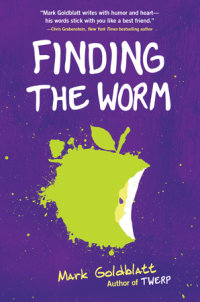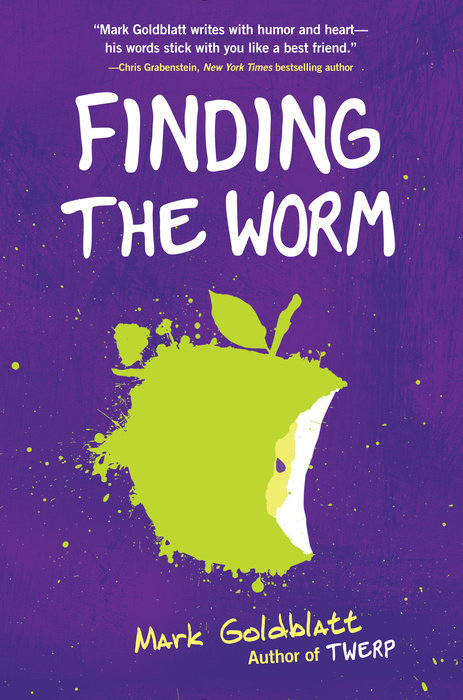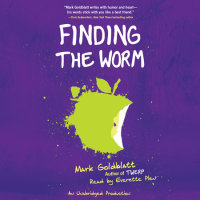Finding the Worm (Twerp Sequel)
Finding the Worm (Twerp Sequel) is a part of the Twerp Series collection.
The New York Post praised Twerp as “reminiscent of The Perks of Being a Wallflower.” Finding the Worm is a sequel that stands on its own--an unforgettable coming-of-age story about life, loss, and friendship. Perfect for fans of The Sandlot and readers who love books by Jennifer L. Holm, Andrew Clements, and Rebecca Stead.
It’s not a test unless you can fail. . . .
Trouble always seems to find thirteen-year-old Julian Twerski. First it was a bullying incident, and now he’s been accused of vandalizing a painting. The principal doesn’t want to suspend him again, so instead, he asks Julian to write a 200-word essay on good citizenship. Julian writes 200 no’s instead, and so begins an epic struggle between Julian and his principal.
Being falsely accused is bad enough, but outside of school, Julian’s dealing with even bigger issues. His friend Quentin has been really sick. How can life be fair when the nicest guy in your group has cancer? Julian’s faith and friendships are put to the test . . . and the stakes have never been higher.
Praise for Twerp:
A Bank Street Best Book of the Year
A Junior Library Guild Selection
A Summer Top Ten Kids’ Indie Next List Pick
“Reminiscent of The Perks of Being a Wallflower. . . . You don’t have to be a twerp to read this book.” —New York Post
“A vivid, absorbing story about one boy’s misadventure, heartache, and hope for himself.” —Rebecca Stead, Newbery Medal–winning author of When You Reach Me
“[Fans of] Jeff Kinney’s Diary of a Wimpy Kid who have matured beyond the scope and gravity of that series will find a kindred spirit in Julian.” —School Library Journal
“Reminiscent of movies like The Sandlot. . . . Well-written and funny.” —The Advocate
“Alternately poignant and comical. . . . A thought-provoking exploration of bullying, personal integrity and self-acceptance.” —Kirkus Reviews
“Funny, poignant, and an effective commentary on bullying and its consequences.” —The Horn Book Magazine
An Excerpt fromFinding the Worm (Twerp Sequel)
Julian Twerski December 8, 1969
The Guidance Counselor
You know the noise the intercom makes when it comes on, the crackle you hear a second before the principal starts to talk? You can hear that noise a hundred times, and you know, just from the crackle, you don’t have to pay attention. But then, the one time you do have to pay attention, the noise sounds different. The crackle sounds different. It sends a chill through you, and you know the principal is going to say your name. It’s like that creepy old saying “Ask not for whom the bell tolls. It tolls for thee.” Except instead of a bell, you’ve got that crackle.
It was the middle of second period when the intercom crackled, and the announcement came. I was in science class, converting Farenheit degrees to Celsius. Here’s what Principal Salvatore said: “Will the following students please report to the guidance counselor’s office: Lonnie Fine. Eric Haft. Beverly Segal. Julian Twerski. Howard Wurtzberg. Shlomo Zizner.”
That’s the entire Thirty-Fourth Avenue gang—minus Quentin, who’d gone into the hospital over the weekend, plus Beverly, who lives on the block and who hangs around with us sometimes. It didn’t take a genius to know that something was going on with Quentin.
As soon as Beverly and I stood up, the class began to hoot, like the two of us had gotten in trouble. My heart thumped up into my throat, and my face went hot and then cold.
I thought Quentin was dead.
“Look, he’s gonna bawl!” a guy two rows to the side of me said. At that point, I couldn’t have cared less what he thought. What anyone thought. I left my books on my desk and rushed out the door.
Beverly was a couple of steps behind me. Once we were out in the hall, she ran to catch up and said, “He’s going to be okay, isn’t he?”
I was afraid if I answered her I would bawl, so I just kept walking.
“Julian!” she said.
The way she said my name made me mad. “You think I know more than you do?”
What I knew, what the entire block knew, was that Quentin was sick. Not just cold-and-flu-season sick. It was the third time in the last three months he’d gone to the hospital to get checked out. Beverly knew that as well as I did. She’d been there the first time, when he got dizzy tossing around a football. She’d been there the second time, when he threw up after a half hour of wolf tag, and then the third time, over the past weekend, when he sat down on the sidewalk for no reason and his eyes rolled back in his head.
She grabbed my shoulder, and for a split second, we stopped and looked at one another. Then the two of us started running toward the stairwell. Her long brown hair was flying out behind her as we hit the stairs. It looked like a comet tail as I trailed a step behind her. The entire time, I could hear my heartbeat. Not just feel it, I could hear it. It had gone from my chest to my throat, and now it was in my ears.
The guidance counselor’s office was at the far end of the first floor, next to Principal Salvatore’s office. It took us about a minute to run down the two flights of stairs and across the entire first floor, but that was a long minute.
The guidance counselor, Miss Medina, was standing in the hall outside her office, leaning against the door. The hall was deserted, so we saw her as soon as we turned the corner, but she would’ve been easy to spot even in a crowd. She’s almost six feet tall and has curly blond hair that’s piled up on her head to make her look even taller. I was trying to read the look on her face. What I focused on was her mouth. It was clenched in a tight smile—the kind of smile you get when you’re forcing yourself to smile.
“Go inside and sit down with your friends,” she said. “We’re just waiting for two more.”
Lonnie and Howie were sitting on wooden folding chairs pushed against the far wall of the office. They both glanced up as we came in, but then Howie turned his head and looked out the window. He always got squirmy around Beverly because he’d been sweet on her from the start of third grade until the end of sixth grade—when the rest of us clued him in that he had no chance with her. I sat next to Lonnie, and Beverly sat next to me, and for another minute we just stared down at the worn-out gray carpet.
That was when Shlomo staggered in. His face was pink from running, with a bead of sweat trickling down his forehead, and he was gasping for air. He held up his left hand as he caught his breath and straightened his glasses on his nose. Then, at last, he said, “You don’t think he died, do you?”
“Just sit down,” Lonnie said, and nodded toward an empty chair.
But Shlomo wouldn’t let it go. “Do you think he died? I mean, he couldn’t have just—”
“Sit down and shut up, all right?” Lonnie said. “You know as much as we know.”
Shlomo slid into the chair Lonnie had nodded at, and bent his head down almost to his knees. It always took him longer to catch his breath, since he was out of shape. His breathing was the only sound in the room for another half minute, until Eric the Red walked in, followed by Miss Medina. Eric hustled to the last wooden folding chair as Miss Medina walked behind her desk. I thought she was going to sit down there, but instead she rolled out the chair and parked it in front of the desk, so that she was sitting right in our faces. She still had that same clenched smile on her face. It was scaring the daylights out of me.
Miss Medina said, “I’m sure you’re all curious why you’re here—”
“Did Quentin die?” Shlomo blurted out.
“No, no, no!” she answered, waving her hands back and forth. “Did you think that? I’m so sorry. Quentin is doing fine. He’s a very sick young man, but he has the best doctors in the world looking after him. I spoke to one of them this morning, and he said Quentin has a tumor. It’s in the back of his head, close to his brain. That’s the reason he hasn’t been himself lately. . . .”
“Tumor means cancer, right?” Shlomo said.
“It’s a kind of cancer,” she said. “I know that’s a scary word, but Quentin has a good prognosis. Do you know what a prognosis is?”
Beverly answered, “Isn’t it like a prediction?”
“Yes, it’s like a prediction,” Miss Medina said. “It’s a medical prediction. It’s the kind of prediction doctors make. Quentin’s doctors predict he’ll be back in school in no time. If all goes well, he’ll be going to classes, doing homework, even shooting baskets in the school yard just like old times.”
“Quentin didn’t shoot baskets,” Eric said.
“Maybe he will when he gets back,” she said. “The point is, he’ll be able to shoot baskets if he wants. Isn’t that good news?”
“How long until he gets back?” I asked.
“You’re Julian, right? The boy who keeps a journal?”
“That was last year.”
“It’s good to keep a journal,” she said. “It’s good to get your feelings down on paper. This might be an opportunity—”
“You still didn’t answer Julian’s question,” Lonnie said. “How long until Quentin comes back to school?”
“And your name is?”
“Lonnie.”
“No one can answer that, Lonnie. But sooner rather than later.”
“So why did you pull us out of class?” Shlomo asked.
Miss Medina nodded. “That’s a fair point. I didn’t intend to frighten you, and I’m so sorry if I did. I just wanted to let you know that I’m here for you. It’s natural that you’d be worried about Quentin. We worry about the people we love. We worry so much, in fact, that worrying can sometimes get in the way of the work we’re supposed to be doing. It can become a distraction. Does that make sense to you?”
That was when Lonnie spoke up again. “I think about Quentin all the time.”
“When you do, what do you think about?”
“You know—just stuff. Sad stuff, I guess. But it’s a real distraction. I can hardly think about anything else.”
“That’s normal. It’s very normal. And it’s nothing to be ashamed of.”
Lonnie began shaking his head, laying it on thick. “It’s like, ever since he got sick, I’ll be sitting at home, trying to do homework, but no matter how hard I concentrate, I keep thinking about Quentin. I can’t stop myself, and like an hour goes by, and I’ve only done one math problem.”
“How do you feel afterwards?” Miss Medina said.
“I just feel so . . . distracted.”
“That’s all?”
“I feel like I let myself down,” he said. “Plus, then Mr. Montgomery chews me out the next day in math class.”
Miss Medina nodded, then rolled her chair to her desk and made a note on a pad of paper. “I’ll have a talk with Mr. Montgomery.”
“I don’t want to get Mr. Montgomery in trouble.”
“You’re not getting him in trouble, Lonnie. I’m just going to talk to him.”
“Thank you, Miss Medina,” Lonnie said.
“What about the rest of you?” As she reached again for her pad and pencil, Shlomo leaned forward and was about to say something, but Lonnie shot him a look, and he clammed up. “So the rest of you are doing all right in your classes?”
“Yes, ma’am,” we mumbled at the same time.
“But you’ll let me know if that changes, right?”
“Yes, ma’am.”
“That’s a promise?”
“Yes, ma’am.”
Second period was about to end as we left Miss Medina’s office. That meant we had to rush back to our classes and pick up our books before the start of third period. There was no time to talk about what had happened—which was just as well. If I’d looked Lonnie in the eye, neither of us could’ve kept a straight face. I couldn’t believe he’d come up with a get-out-of-jail-free card for math. It was his worst subject, and now he had the guidance counselor telling Mr. Montgomery to go easy on him. Lonnie might not be the greatest student, but he’s the quickest thinker I know.
It was also a relief to know Quentin was going to be all right. Just the same, it was hard to see why Miss Medina had pulled us out of class like that—Shlomo was right about that much. The more I thought about it, the more pointless it seemed.
Beverly and I, meanwhile, were half walking and half running back to science class. We were near the stairwell at the end of the first floor when she tapped me on the arm and said, “That was really scary. Do you believe her?”
“Who? Miss Medina? Why would she lie to us?”
“You think she’d tell us if Quentin was dying?”
“No, but she wouldn’t call us down to her office to lie to us. That would be stupid.”
“So you believe her?”
“You were there, Beverly. You heard the same thing I heard.”
“Why are you being so crabby?”
“I’m not being crabby,” I said. “I just don’t want to talk about it.”
She stopped on a dime and grabbed my arm, which forced me to stop too. Then she took a step back and got a weird smile on her face. She pulled her long brown hair behind her and began to twist it into a knot. “I’ll race you back to science class.”
“What?” I said.
“C’mon, let’s race back to science.”
“What’s the point?”
“The point is to see who’s faster.”
“We both know the answer to that, Beverly.”
“I kept up with you, step for step, on the way down. I was ahead of you—”
“That’s because we were running together,” I said.
“So you let me keep up? Is that what you’re saying?”
“Well, yeah.”
“Then why not race me?”
“I’m not racing you,” I said. “It’s a stupid idea.”
“Sixth grade was last year.”
“What’s that supposed to mean?”
“You were the fastest kid in sixth grade. You were faster than me last year, and I admit it. But things change, Julian. Different grade. Different school.”
“Yeah, but it’s still you and me.”
“I’ve gotten a lot faster since last year. I’m five feet tall now. I’m as tall as you are.”
“I’m not doing it, Beverly.”
“Why not?”
“Because you’re a girl!”
“So you’re afraid of losing to a girl?”
“I’m not afraid of losing. It’s just not a fair race.” I pushed open the door to the stairwell. “C’mon, the bell’s gonna go off any second.”
As soon as I opened the door, she shot through it and raced up the stairs.
“See you in science class!” she called back to me.
“C’mon, Beverly!”
She was making clucking chicken noises as she disappeared up the first flight.


